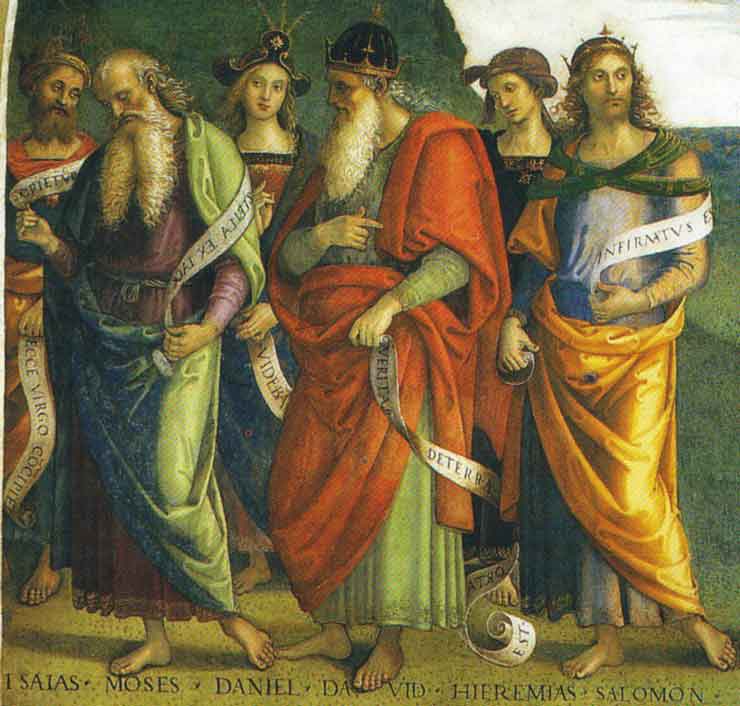Chapter 2
The Transmission of Divine Revelation
As finite human creatures we cannot hope to fully understand God but we can know him by analogy and through human experience. For example God is a Father like a perfect human father. Yet God can choose to reveal to us something of His divine mystery. Divine revelation is
God’s self-communication to man – the unveiling of the invisible inner life of God Himself: “The eternal life which dwelt with the Father and was made visible to us.” (
DV 1, cf. 1 John 1:2) God can reveal Himself through His creation, through the words of his prophets, or ultimately though the very Person of Jesus Christ. It is the face of Christ which reveals God most fully to man.
God reveals his own inner life because He wants to share it with us! He wants us to partake of the richness of infinite love! “God’s will was that men should . . . become sharers in the divine nature” (DV 2). Specifically, this is why the Father sent His Son into the world: “For God so loved the word that He gave His only Son, so that everyone who believes in Him might not perish but might have eternal life” (John 3:16). Also, “I came that they may have life, and have it abundantly” (John 10:10).
God’s motivation for revealing Himself is purely His own love for us. Love is the whole motive of Revelation! “But God proves his love for us in that while we were still sinners Christ died for us.” (Romans 5:8). How does God communicate this revelation to us?
To transmit means to ‘pass down’ or ‘hand on’. These expressions come from the world of discipleship. A disciple was expected to preserve and ‘pass down’ the tradition of his master or rabbi. The Apostle Paul writes; “For I received from the Lord what I also handed on to you, that the Lord Jesus, on the night he was handed over, took bread, and, after he had given thanks, broke it and said, ‘This is my body that is for you. Do this in remembrance of me’ (1 Corinthians 11:23-24). The words of the Institution of the Eucharist are part of the essential apostolic
tradition St. Paul ‘received’ and ‘handed on’. He writes; “For ‘everyone who calls on the name of the Lord will be saved.
’ But how can they call on him in whom they have not believed? And how can they believe in him of whom they have not heard? And how can they hear without someone to preach?” (Romans 10: 13b-14). While we can certainly learn that God exists from creation, we need to hear the Gospel preached to have the eyes of our heart opened to the full reality of God’s love for us. The process through which God reveals himself in special revelation is called
divine inspiration. While the precise inner working remains a mystery, we have the combined activity of a normal human author and God himself who remains the primary author of what is written. The inspiration of the Holy Spirit guarantees the truth of what is said when it is understood in the context of apostolic tradition.
“For man to be able to enter into real intimacy with Him, God willed both to reveal Himself to man and to give him the grace of being able to welcome this revelation in faith” (CCC 35). Not only does God reveal himself in a special and clear way through divine revelation, but he also makes possible the acceptance of His revelation through the power of grace working in our souls. Without the grace to accept this revelation, it would not be a help to man. Yet, God does not merely reveal those truths which are unknowable through human reason alone, for example the Triune nature of the Godhead. He also reveals those truths knowable by reason alone that man can know them easily and surely. “Divine Revelation encompasses not only what exceeds man’s natural understanding, but religious and moral truths which, although they are not in themselves beyond the grasp of human reason, need to be known by all men with ease, with firm certainty and with no admixture of error” (CCC 38). Sacred Scripture not only speaks of creation from nothing, but also the love of God and His perfection, truths which can be discerned from reason alone.
God’s revelation includes both the written deposit found in Sacred Scripture and the living traditions pass on by the successors of the apostles in the Church. The whole content of Divine Revelation, written and oral, entrusted to the Church is called the
deposit of faith. The fathers of the Second Vatican note, “Sacred Tradition and Sacred Scripture form one sacred deposit of the Word of God” (DV 10). We can distinguish between Sacred Scripture as “The word of God as consigned to writing under the inspiration of the Holy Spirit” (DV 9) and Sacred Tradition “the Word of God entrusted by Christ the Lord and the Holy Spirit to the Apostles” and handed on to their successors in its full purity (DV 9).
“Holy Scripture is the utterance of God, in so far as it was written down under the Holy Spirit’s inspiration; while sacred Tradition hands on in its entirety the word of God, that was committed to the apostles, by Christ our Lord and the Holy Spirit to their successors, in order that being enlightened by the Spirit of Truth, they may in their preaching faithfully preserve, set forth and disseminate it” (DV 9). Both Sacred Scripture and Sacred Tradition “spring from the same divine fountain, and so in some manner merge into a unity, and tend towards the same end” (DV 9). Sacred Scripture was intended to be rooted and understood in the context of apostolic discipleship or the
succession of the apostles.



















